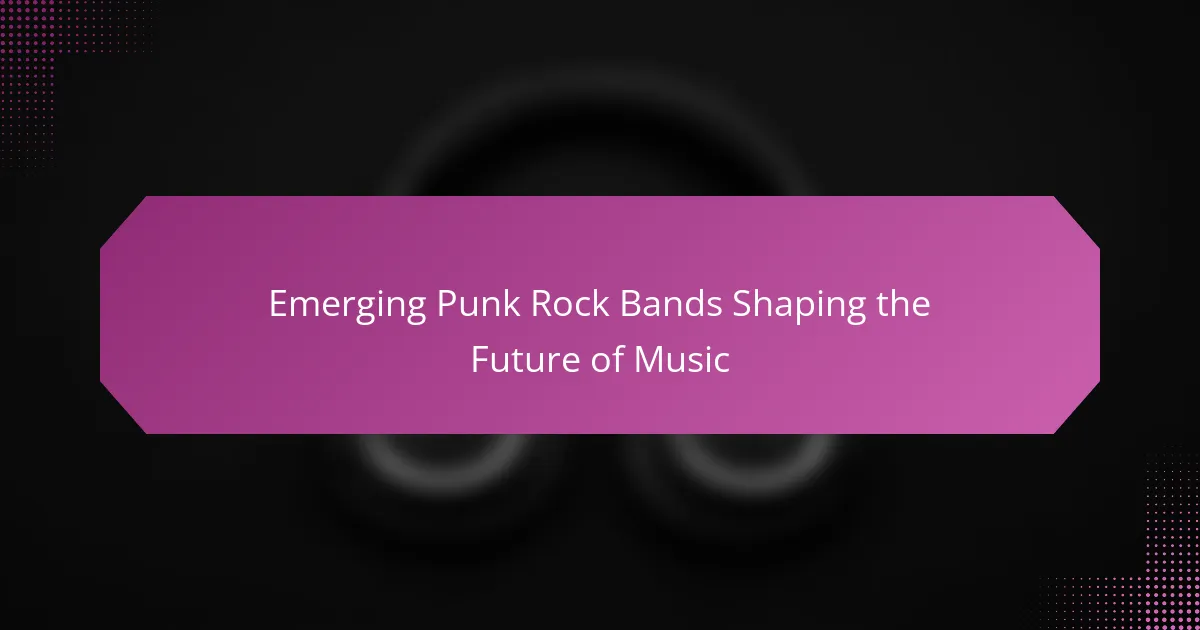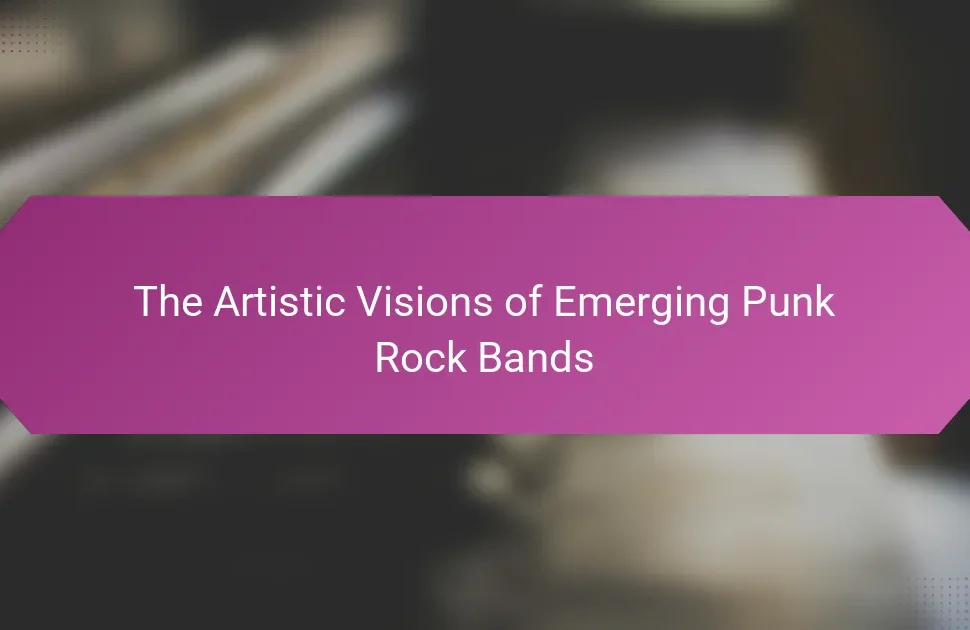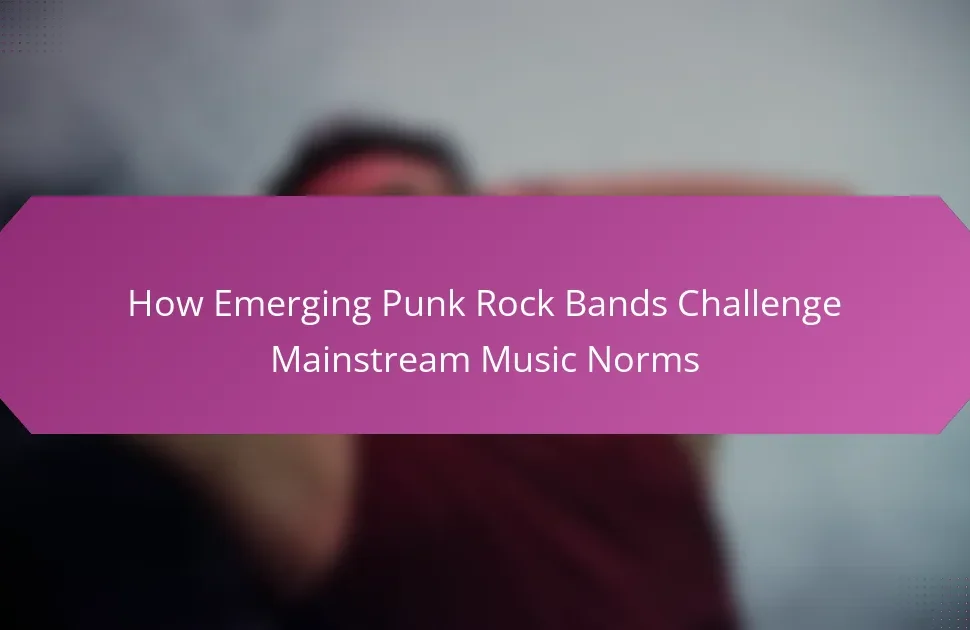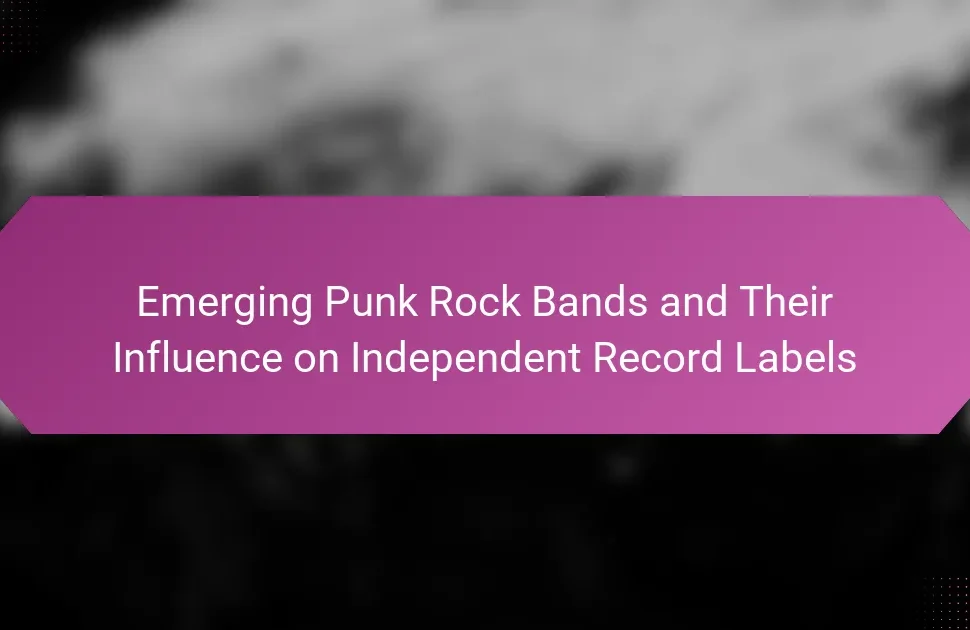Emerging punk rock bands are reshaping the music landscape with their unique sounds and socio-political themes. They blend traditional punk elements with contemporary influences, addressing social issues and personal struggles. Key bands like Amyl and the Sniffers and IDLES exemplify this trend, gaining visibility through social media and live performances. Despite facing challenges such as financial instability and competition, these bands continue to push boundaries and attract diverse audiences.
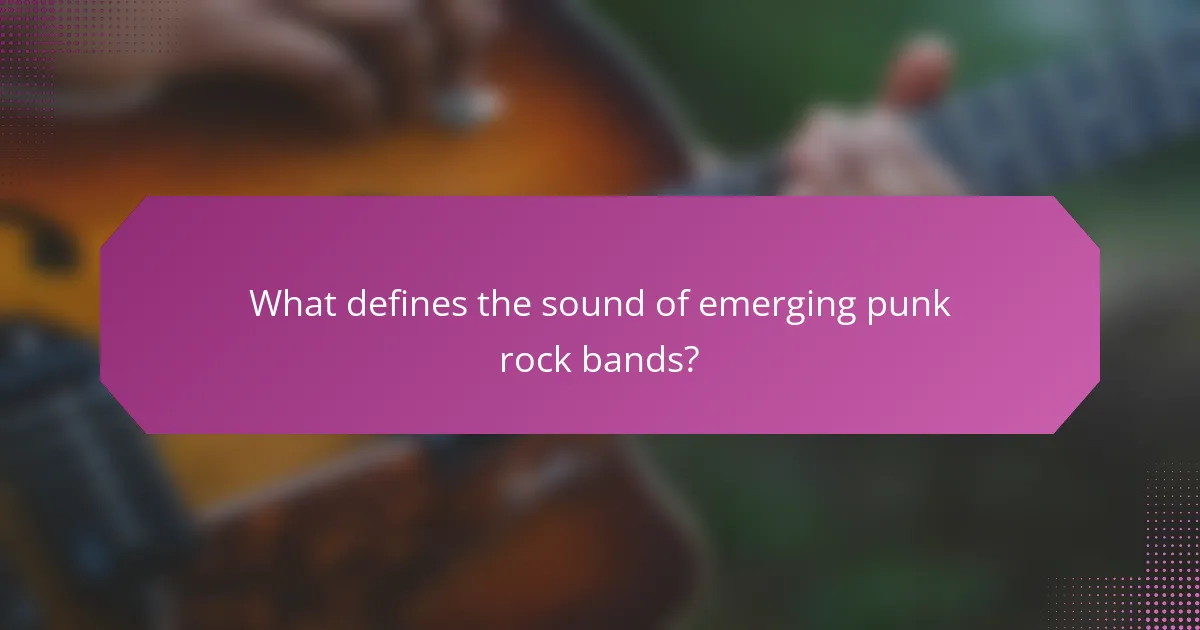
What defines the sound of emerging punk rock bands?
Emerging punk rock bands are defined by their raw energy, unique sound, and socio-political themes. These bands often blend traditional punk elements with contemporary influences, creating a fresh and dynamic music landscape. Their sound typically features fast tempos, distorted guitars, and aggressive vocals.
The lyrical content often addresses social issues, personal struggles, and rebellion, resonating with a new generation. Bands like Amyl and the Sniffers and IDLES exemplify this trend, incorporating diverse influences while maintaining punk’s core ethos. Their innovative approaches are shaping the future of music, pushing boundaries and challenging norms.
How do musical influences shape their style?
Musical influences significantly shape the style of emerging punk rock bands by blending various genres. Bands often draw inspiration from classic punk, alternative rock, and even pop elements, creating a unique sound. For instance, many incorporate the raw energy of 1970s punk with contemporary lyrical themes. This fusion allows them to connect with diverse audiences while maintaining authenticity. Additionally, collaborations with artists from different genres introduce innovative techniques and broaden their musical palette, further defining their style.
What role do lyrics play in their identity?
Lyrics play a crucial role in shaping the identity of emerging punk rock bands. They often express rebellion, individuality, and social commentary, resonating with fans who seek authenticity. The themes in lyrics reflect personal experiences and collective struggles, establishing a deep connection with the audience. Unique lyrical styles differentiate bands, creating memorable identities that contribute to the genre’s evolution.
Which instruments are commonly used in their music?
Emerging punk rock bands commonly use electric guitars, bass guitars, drums, and vocals in their music. These instruments create a raw and energetic sound characteristic of the genre. Bands often experiment with effects pedals and synthesizers, adding unique textures to their compositions. The integration of diverse instruments reflects a rare attribute, showcasing their innovative approach to punk rock.
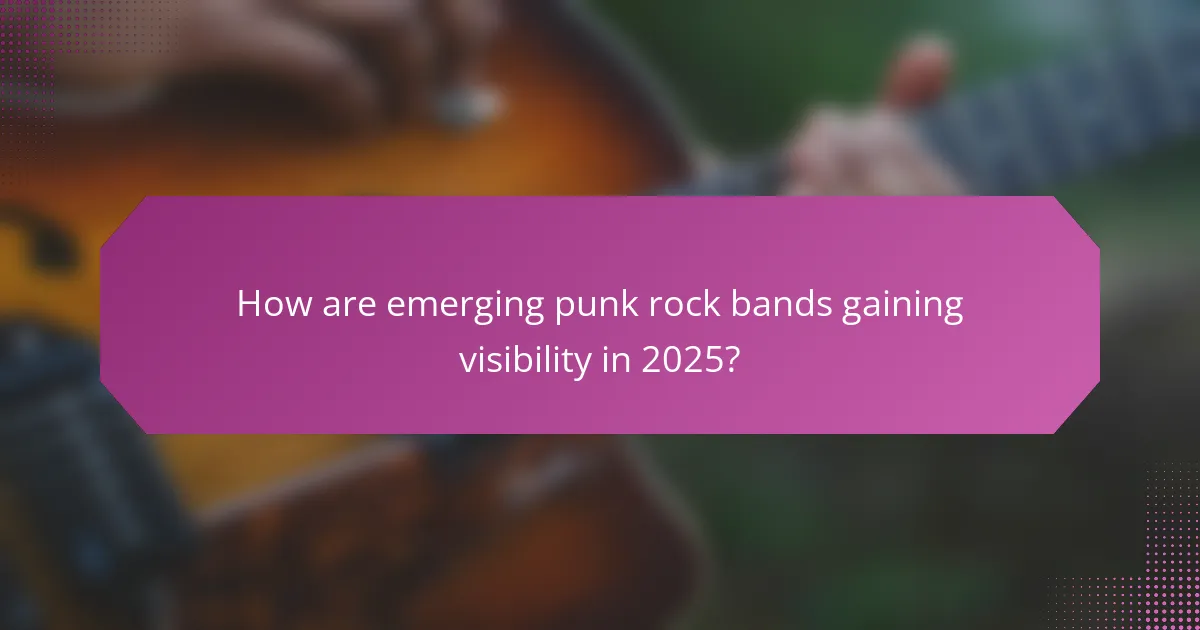
How are emerging punk rock bands gaining visibility in 2025?
Emerging punk rock bands are gaining visibility in 2025 through social media, live streaming, and collaborations. These platforms allow them to reach wider audiences and engage directly with fans. Social media enables real-time interaction, while live streaming performances provide global access. Collaborations with established artists further enhance their exposure. The unique sound and fresh perspectives of these bands attract diverse listener demographics, contributing to the evolution of the punk rock genre.
What platforms are most effective for promotion?
Social media platforms are the most effective for promoting emerging punk rock bands. These platforms allow for direct engagement with fans and showcase music through videos and posts.
Instagram is particularly powerful for visual storytelling, while TikTok creates viral trends that can rapidly increase a band’s visibility. Facebook facilitates community building and event promotion. Bandcamp and SoundCloud serve as dedicated music-sharing platforms, enabling direct sales and fan interaction.
Additionally, YouTube remains crucial for music videos and live performances, offering a wide reach. These platforms collectively shape the future of music by connecting artists with audiences in innovative ways.
How do social media strategies differ among bands?
Social media strategies among emerging punk rock bands differ primarily in their engagement methods and content types. Bands often utilize platforms like Instagram and TikTok for visual storytelling, while others may focus on Twitter for real-time interactions.
Emerging bands typically emphasize authenticity, sharing behind-the-scenes content to connect with fans. This contrasts with more established bands that may have polished marketing approaches. Unique attributes include the use of DIY aesthetics in promotional materials, which resonate with the punk ethos.
Additionally, the frequency of live streaming performances has become a rare attribute among newer bands, enhancing direct fan engagement. These strategies reflect a broader shift in how music is consumed and promoted in the digital age.

What challenges do new punk rock bands face today?
Emerging punk rock bands face significant challenges today, including financial instability, competition for exposure, and evolving music consumption trends. Many struggle to secure funding for recordings and tours, limiting their growth opportunities. The digital landscape has intensified competition, making it harder for new bands to stand out in a saturated market. Additionally, changing consumer habits, such as the shift towards streaming services, impact traditional revenue streams. These factors create a complex environment for new punk rock bands aiming to make their mark in the music industry.
How does funding impact their growth and sustainability?
Funding significantly enhances the growth and sustainability of emerging punk rock bands by providing essential resources. Access to financial support enables these bands to invest in quality recordings, marketing, and touring, which are crucial for reaching wider audiences. Additionally, funding helps cover operational costs, allowing bands to focus on their creative processes rather than financial constraints.
Moreover, financial backing can lead to collaborations with established artists and producers, further elevating a band’s visibility and credibility. This support fosters a more vibrant music scene, encouraging innovation and diversity within the genre. Ultimately, the right funding can be a game-changer, transforming potential into success for these bands.
What barriers exist in the music industry for newcomers?
Newcomers in the music industry face significant barriers, including lack of funding, industry connections, and market saturation. Emerging punk rock bands often struggle to gain visibility due to these challenges.
Funding is a primary barrier, as many new bands lack the financial resources for recording, promotion, and touring. Without sufficient capital, they cannot effectively reach potential audiences.
Industry connections are crucial for success. Many newcomers do not have access to established networks, making it difficult to secure gigs, collaborations, or media coverage.
Market saturation presents another challenge. The influx of new music makes it hard for emerging bands to stand out. Unique attributes, like innovative sound or strong branding, can help mitigate this issue but are not always present.
Overall, overcoming these barriers requires creativity, resilience, and strategic planning.
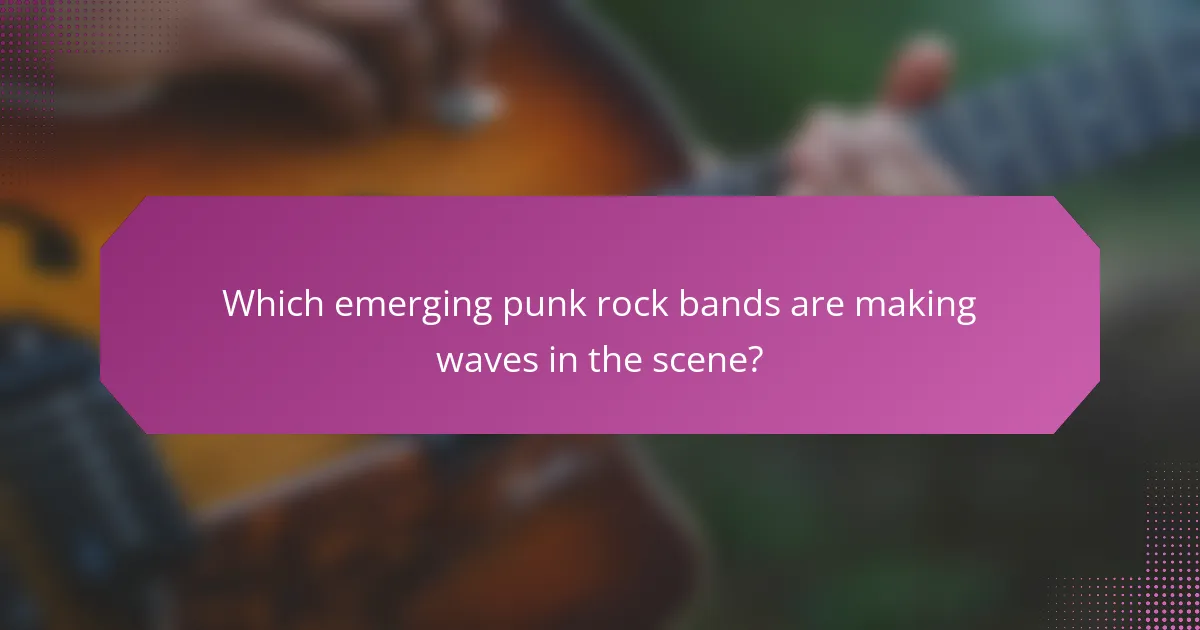
Which emerging punk rock bands are making waves in the scene?
Several emerging punk rock bands are gaining recognition for their unique sounds and fresh perspectives. These bands are redefining the genre and attracting new audiences.
One notable band is “Amyl and the Sniffers,” known for their energetic performances and raw lyrics. Another is “Puppy,” blending punk with heavy metal influences, creating a distinctive sound. “The Chats” have gained popularity with their catchy tunes and humorous lyrics, while “IDLES” are celebrated for their socially conscious themes and powerful live shows.
These bands exemplify the evolving nature of punk rock, showcasing diverse influences and innovative styles that resonate with younger generations. Their impact on the scene is evident as they continue to push boundaries and inspire fans.
What unique sounds do these bands bring to the genre?
Emerging punk rock bands introduce diverse sounds that redefine the genre. Bands like Idles and Fontaines D.C. blend intense energy with socio-political commentary. Others, such as Amyl and the Sniffers, incorporate elements of garage rock, creating a raw, authentic vibe. Unique vocal styles and innovative instrumentation contribute to their distinctiveness, pushing punk rock into new territories.
How are regional influences reflected in their music?
Regional influences are deeply embedded in the music of emerging punk rock bands, shaping their sound and themes. Bands often draw inspiration from local culture, history, and socio-political issues. For instance, bands from urban areas may reflect the struggles of city life, while those from rural regions might incorporate themes of isolation or community.
Distinctive musical styles emerge based on regional characteristics, such as the use of local dialects or traditional instruments. This creates a unique sound that resonates with local audiences while also appealing to broader punk rock fans. The authenticity of these influences often leads to a more profound connection with listeners.
Moreover, the punk rock genre’s emphasis on rebellion and social commentary allows these bands to address specific regional issues, making their music a platform for activism. This connection between regional identity and musical expression ensures that emerging punk rock bands continue to shape the future of music while remaining grounded in their local contexts.
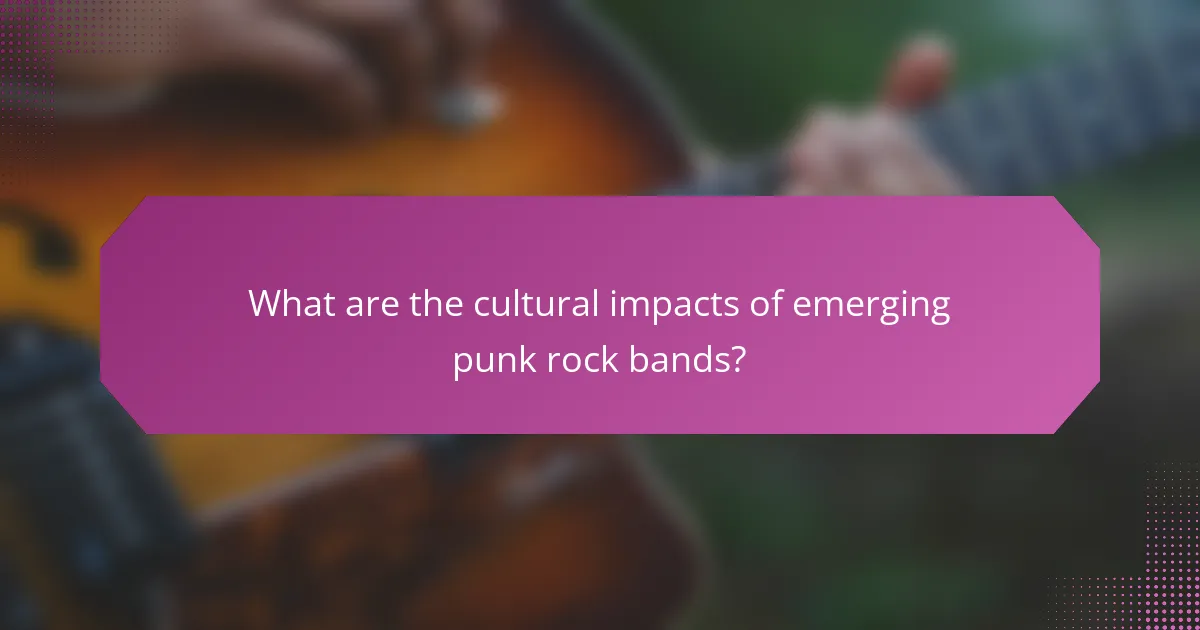
What are the cultural impacts of emerging punk rock bands?
Emerging punk rock bands significantly influence culture by challenging norms and promoting social change. They often address issues like inequality, identity, and political dissent, resonating with youth. Their DIY ethos encourages creativity and self-expression, fostering community and collaboration. As a result, these bands shape not only music but also fashion, art, and activism, creating a vibrant cultural landscape.
How do they engage with social and political issues?
Emerging punk rock bands engage with social and political issues through powerful lyrics and activism. They address topics like inequality, environmental concerns, and mental health, reflecting the struggles of contemporary society. Bands such as Idles and Amyl and the Sniffers use their platforms to raise awareness and inspire change. Their music resonates with listeners, fostering a sense of community and encouraging dialogue about pressing issues. This engagement shapes the future of music by blending artistry with activism, making punk rock a relevant voice in today’s cultural landscape.
What community initiatives are they involved in?
Emerging punk rock bands actively engage in various community initiatives. They often participate in local charity events, support mental health awareness campaigns, and collaborate with grassroots organizations to promote social change. These efforts reflect their commitment to using music as a platform for positive impact. Many bands also organize benefit concerts, donating proceeds to causes such as environmental conservation and youth programs.
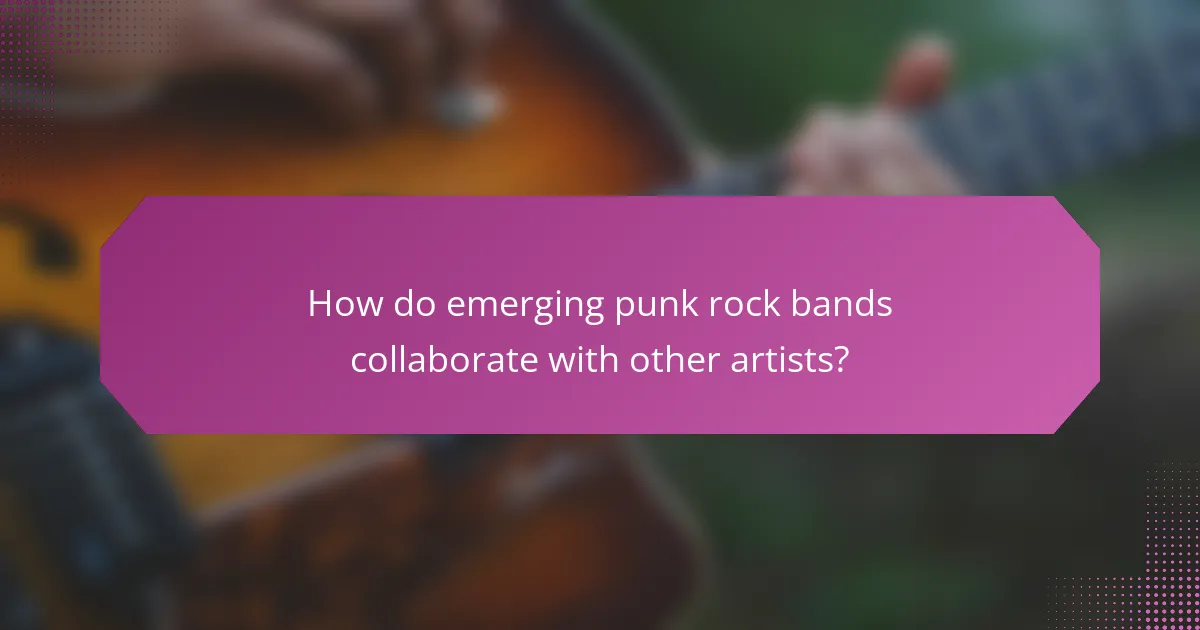
How do emerging punk rock bands collaborate with other artists?
Emerging punk rock bands collaborate with other artists through genre-blending projects and live performances. These collaborations often fuse punk with other styles, creating innovative sounds. For instance, bands may partner with hip-hop artists or electronic musicians, expanding their reach and audience. This trend reflects a unique attribute of the punk genre’s adaptability, allowing fresh influences to shape its evolution. Additionally, collaborations can lead to rare opportunities for cross-promotion and exposure in diverse music scenes.
What benefits arise from cross-genre collaborations?
Cross-genre collaborations bring innovation, broaden audience reach, and foster creativity in emerging punk rock bands. These collaborations allow artists to blend styles, creating unique sounds that attract diverse listeners. As a result, bands can explore new themes and experiment with different musical elements. This fusion often leads to increased visibility and opportunities in the music industry, shaping the future of punk rock.
How do collaborations enhance their reach and influence?
Collaborations significantly enhance the reach and influence of emerging punk rock bands. By partnering with established artists or brands, these bands gain access to wider audiences and increased visibility. Collaborations often lead to cross-promotion on social media and shared fan bases, amplifying their message. Additionally, working with diverse artists fosters creativity, resulting in unique sounds that attract attention. This dynamic approach helps emerging bands carve out a distinct identity in the competitive music landscape.
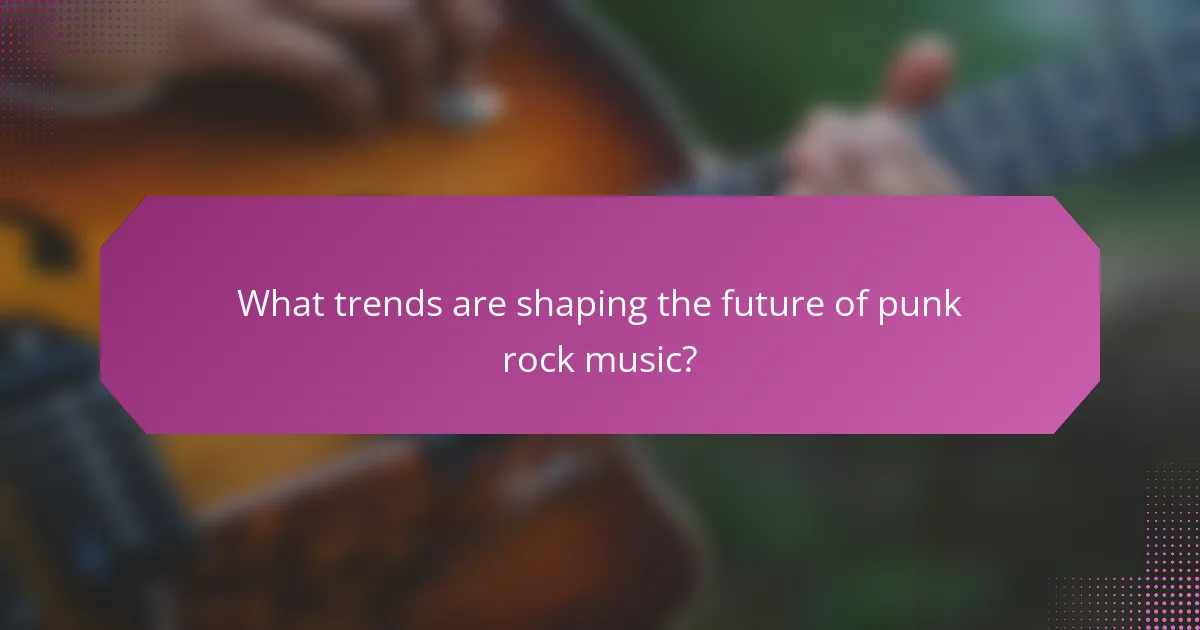
What trends are shaping the future of punk rock music?
Emerging punk rock bands are redefining the genre with innovative sounds and diverse influences. These bands often blend traditional punk elements with genres like pop, hip-hop, and electronic music, creating fresh auditory experiences. Notable examples include groups like Amyl and the Sniffers and IDLES, who address social issues through their lyrics, resonating with younger audiences. The DIY ethic remains strong, with many bands leveraging social media for promotion and fan engagement. This trend showcases the genre’s adaptability and relevance in today’s music landscape.
How are technology and innovation influencing sound production?
Technology and innovation are revolutionizing sound production by enhancing creativity and accessibility. Emerging punk rock bands utilize digital tools and platforms to create unique sounds and reach wider audiences.
Advancements in software allow for intricate sound manipulation, enabling bands to experiment with genres. Affordable recording equipment democratizes music production, empowering independent artists.
Streaming services facilitate global distribution, allowing emerging bands to gain recognition without traditional label support. Social media platforms enable direct engagement with fans, fostering community and collaboration.
These changes are shaping the future of music, as punk rock bands embrace technology to redefine their artistic expression.
What role does audience engagement play in shaping these trends?
Audience engagement is crucial in shaping trends among emerging punk rock bands. It fosters a community that influences music direction and style. Social media platforms allow fans to interact directly with bands, creating a feedback loop that shapes sound and image. For example, bands often adapt their lyrics or performance styles based on audience reactions, enhancing relatability. This dynamic interaction drives innovation and keeps the genre evolving, ensuring that punk rock remains relevant and resonant with new generations.

What best practices can emerging punk rock bands adopt for success?
Emerging punk rock bands can adopt several best practices for success. Fostering a strong online presence through social media is crucial. Engaging with fans directly builds loyalty and community. Regularly releasing new music maintains visibility in a competitive landscape. Collaborating with established artists can enhance credibility and reach. Performing live shows, even in unconventional venues, creates memorable experiences. Lastly, staying authentic to their sound and message resonates deeply with audiences.
How can they effectively build a loyal fan base?
Emerging punk rock bands can effectively build a loyal fan base by engaging authentically with their audience. They should prioritize social media interaction, leverage live performances, and create relatable content.
Regularly releasing new music keeps fans engaged and excited. Collaborating with other artists can also expand their reach and introduce them to new audiences. Hosting events or exclusive listening parties fosters a sense of community among fans.
Building a unique brand identity helps differentiate them in a crowded market. Consistent messaging and visuals create recognition and loyalty. Additionally, offering merchandise can strengthen the connection with fans who want to support the band.
Finally, actively seeking feedback from fans shows that their opinions matter, which can enhance loyalty. By focusing on these strategies, emerging punk rock bands can cultivate a dedicated and passionate fan base.
What are common mistakes to avoid in the early stages of a band’s career?
Emerging punk rock bands should avoid several common mistakes in their early careers. Failing to develop a unique sound can lead to blending in with the crowd. Neglecting social media presence limits audience engagement and growth. Overlooking live performance quality can damage reputation and fan retention. Ignoring networking opportunities restricts essential connections within the music industry. Lastly, mismanaging finances can hinder sustainability and future projects.
